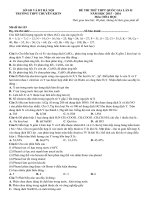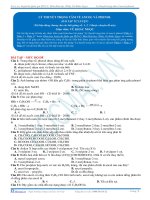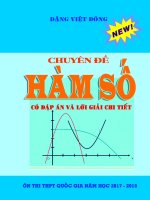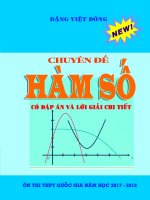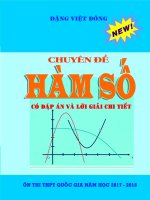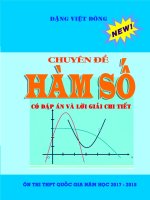Bộ đề thi Tiếng Anh có đáp án và lời giải chi tiết
Bạn đang xem bản rút gọn của tài liệu. Xem và tải ngay bản đầy đủ của tài liệu tại đây (162.78 KB, 35 trang )
Lời nói đầu:
Chỉ còn vài tháng nữa là kì thi THPT Quốc gia 2016 sẽ diễn ra. Tháng 2 là thời
gian không gần mà cũng không xa. Nó là thời gian cần thiết để các bạn tập trung
hoàn thành các chuyên đề còn dang dở. Và đồng thời là bước đệm cho các bạn
luyện đề. Các bạn không cần phải gấp rút để giải bài cho thật nhanh mà chỉ củng
cố lại kiến thức đã học dưới hình thức làm đề với điều kiện các bạn đã học xong
các chuyên đề. Riêng đối với môn Tiếng Anh, dựa theo kinh nghiệm học và thi của
bản thân, mình nghĩ dù bạn học chưa hết tất cả các điểm ngữ pháp thì cũng nên
luyện đề. Bởi ta chỉ cần nắm những điểm ngữ pháp cơ bản là bạn đã có thể giải bài
rồi. Điểm khác biệt giữa người giỏi với người không giỏi là từ điểm cơ bản đó, họ
đã ứng dụng linh hoạt nó như thế nào trong từng bài, hoàn cảnh cụ thể.
Vậy bạn muốn thi khối D, có môn Tiếng Anh, bạn không giỏi ngữ pháp, bạn có
nên chờ học xong rồi giải đề? Nó chỉ đúng với những bạn xem môn Anh là môn tốt
nghiệp thôi. Còn các bạn thì nên kết hợp vừa học chuyên đề vừa giải đề.
Kết hợp như thế nào là đúng? Tháng 2 là tháng thoải mái nhất để luyện đề. Bạn có
thể chia thời gian 1 tuần giải 2 đề, sau khi làm mỗi đề bạn tổng hợp lại các điểm
ngữ pháp cần nắm rồi ghi chép vào một cuốn sổ dành cho ngữ pháp và tìm dạng
tương tự để làm. Có thể ứng dụng nó trong chuyên đề mình học để hiểu sâu hơn.
Còn về từ vựng, hãy luôn nhớ một nguyên tắc là học theo cụm từ, không được tách
rời. Bạn có thể lấy nó trực tiếp từ bài đọc.
Đây là đề mà tôi sưu tầm, đề có lời giải và ghi chú các điểm ngữ pháp chi tiết. Các
bạn hãy làm cẩn thân. Số lượng không quan trọng mà quan trọng là chất lượng.
Mình sẽ up đề 1 tuần 2 đề. Mình sẽ up vào ngày thứ ba và thứ bảy. Mìnhhi vọng
các bạn sẽ sắp xếp cho bản thân một lịch ôn thi thật cụ thể và thực hiện nó một
cách chăm chỉ. Nếu làm được như thế, các bạn sẽ thành công. Chúc các bạn đạt
được sô điểm cao nhất và thành công trên con đường mình đã chọn.
Mình đang học về ngoại ngữ nên nếu có vấn đề gì thắc mắc về việc học Tiếng
Anh. Nếu giúp được thì mình sẽ giúp. Cứ hỏi mình nhé. Email:
Nếu các bạn muốn trò chuyện qua facebook thì hãy nói cho
mình biết qua email nhé!
ĐỀ SỐ 1:
1. A. Profile
B.surpass
C.persuade
D. exchange
2. A. Preference
B. obstate
C. practicing
D. supporter
3. A. Delegate
B. fabulous
C. external
D. slippery
4. A. orient
B. correspond
C. minimum
D. passenger
5. A. untrustworthy
B. diversity
C. encouraging
D. inattentive
6. How well people remember things ….. on many different factors
A. depends
B. depened
C. depending
D. depend
7. No charge will be made if you cancel within 10 days. But cancellations … in
writing.
A. will make
B. must be made
C. must make
D. can make
8. Scientists agree that the world’s climate …. Warmer over the past 50 years,
but they disagree about the causes
A. is becoming
B. becomes
C. became
D. has become
9. You… concern yourself with the program. The organizers of the festival will
take care of it.
A. mustn’t
B. needn’t
C. may not
D. might not
10. To end or greatly reduce pollution…., people would have to stop using
many things that benefit them
A. constantly
B. suddenly
C. immediately
D. usually
11. Ben went…. the competition and won the first prize
A. on
B. in for
C. away
D. through
12.The last of these reasons is … the most important
A. so
B. very
C. far
D. by far
13. ….. I ask Martha for a date and she laughs at me?
A. What should
B. What if
C. what would
D. As if
14. “ You should concerntrate on…. The teacher is saying”
A. what
B. which
C. that
D. whom
15.…. we arrived the hotel when there was a power cut
A. Not only had
B. Hardly had
C. No sooner had
D. Little had
16. The temperatures … take place vary widely for different materials
A. At which they melt and freez
B. Which melting and freezing
C.Which they melt and freeze
D. At which melting and freezing
17. My father suppose, …., that he will be retiring at 60
A. like most people did
C. as do most people
B. like most people do
D. as most of people
18. He spent too much money and…. with his credit card payments.
A. got by on
C. got on well with
B. go into a mess
D. got away with
19. She asked Mark to….. the children while she went to the shops.
A. keep an eye on
B. keep in touch with
C. keep quiet
D. bring up
20. ….. Ann by phone, James decided to email her.
A. Having failed to contact
B. Having failed contacting
C. He failed to contact
D.That he failed to contacting
21. Tim looks so frightened and upset. He …. something terrible
A. must experience
C. can have experienced
B. should have experienced
D. must have experienced
22. If you’re too…., other people will take advantage of you
A. trusting
B. trustworthy
C. trusted
D. untrustworthy
23. I think the …. Thing would be to take a taxi home. I’m tired of walking.
A. sensitive
B. sensational
C. sensible
D. senseless
24. You’d better cut… animal fat if you want to lower your cholesterol level
A. out in
B. down with
C. off with
D. down on
25. “ I can’t remember us ever ….., “ replied the stranger.
A. being met
B. to have met
C. having met
D. to meet
26. I expect the new trend will soon …. here.
A. take up
B. catch up
C. catch on
D. indentify with
27. The Continenal United States is …. that there four time zones.
A. so a big area
B. very big
C. much big
D. so big area
28. In my view the changes to the education system have been to good …
A. outcome
B. upshot
C. influence
D. effect
29. -“I left work early today, dear.”
A. Why was that?
B. Why did you leave
C. How’s that?
D. when so
30. –“ Wait! I have something to do before we can go to the play.”
- “…! We don’t have much time, honey.”
A. Leave immediately
B. come on
C. come at once
D. no way
Mark the letter A, B, C or D on your answer sheet to indicate the
word/phrase that is closest in meaning to the underlined part.
31. In the 1985, the Coca-Cola Company altered the secret formula of the
drink’s ingredients.
A. modified
B. proposed
C. enriched
D. restored
32. In my experience, freshmen today are different from those I knew, 2 years
ago
A. new counselours
C. new students
B. first-year students
D. young professors
33. To preparee for a job interview, you should jot down your qualifications,
work experience as well as some important information about yourself.
A. what you have experienced
C. your own qualities in real life
B. your big data and special qualities
D. what you have earned through study
Mark the letter A, B, C or D on your answer sheet to indicate the word or
phrase that is OPPOSITE in meaning to the underlined part in each of the
following questions.
34. The relationship between strture, process and outcome is very unclear.
A. disappear
B. external
C. apparent
D. uncertain
35. The situation in the country has remained relatively stable for a few months
now
A. constant
B. changeable
C. objective
D. ignorant
Read the following passage and mark the letter A, B, C or D on your
answer sheet to indicate the correct word for each of the blanks.
No one can say when sports began. Since it is impossible to (36)….. a time
when children did not spontaneously run races or wrestle, it is clear that
children have always included sports in their play, but one can only speculate
about the (37)… of sports as autotelic physical contest for (38)…. Hunters are
depicted in prehistoric art, but it cannot be known (39)… the hunters pursued
their prey in a mood of grim necessity or with the joyful abandon of sportmen.
It is certain, (40)…, from the rich literary and iconographic evidence of all
ancient civilizations that hunting soon bacame an end in itself at least for
royalty and nobility. Archarological evidence also indicates that ball games
were common among ancient people as (41)… as the Chinese and the Aztecs. If
ball games were contests rather than (42)…. ritual performancers, such as the
Japanese football game kemari, then they were sports in the most rigorously
(43)…. sense. That it cannot (44)…. be assumed that they were contest is clear
from the evidence presented by Greek and Roman antiquity, which indicates
that ball games had been for the most part playful pastimes (45)…. Those
recommended for health by the Greek physician Galen in the 2nd century AD.
36.
A. think
B. see
C. have
D. imagine
B. emerge
C. emergency
D. immersion
B. children
C. adults
D. society
B. whether
C. how
D. why
B. so
C. consequently
D. however
B. far
C. similar
D. old
B. competitively
C. noncompetitive
D. competition
37.
A. emergence
38.
A. people
39.
A. when
40.
A. therefore
41.
A. different
42.
A. competitive
43.
A. definite
B. defined
C. definitive
D. definition
B. actually
C. usually
D. simply
B. like
C. alike
D.of
44.
A. really
45.
A. as
Read the following passage and mark the letter A, B, C or D on your
answer sheet to indicate the correct answer to each of the questions.
Etymologically, anthropology is the science of humans. In fact, however, it is
only one of the sciences of humans, bringing together those disciplines the
common aims of which are to describe human beings and explain them on the
basis of the biological and cultural charateristics of the populations among
which they are distributed and to emphasize, through time, the differences and
variations of these populations . These concept of race, on once hand, and that
of culture, on the other, have received special attention; and although their
meaning is still subjecr to debate, these terms are doubtless the most common
of those in the anthropologist’s vocabulary.
Anthropology, which is concerned with the study of human differences, was
born after the Age of Discovery had opened up societies that had remained
outside the technological civilization of the morden West. In fact, the field of
research was at first restricted to those societies that had been given one
unsatisfactory laber after another, “savage”, “ primitive”, “tribal”, traditional”,
or enven “ preliterate”, “prehistorical”, and so on. What such societies had in
common, above all, was being the most “ different” or the most foreign to the
anthropologist; and in the early phases of anthroplogy, the anthropologists were
always European or North America. The distance between the rearcher and the
object of his study has been a charecteristic of anthropological research; it has
been set up anthropologist that he was the “astronomer of the sciences of man.”
Anthropologists today study more than just primitive societies. Their research
extends not only to village communities within modern societies but also to
cities, even to industrial enterprises Nevertheless, anthropology’s first field of
research, and the one that perhaps remains the most important, particular, it is
concerned with generalizing about patterns of human behavior seen in all their
dimensions and with achieving a total description of social and cultural
phenomena, this is because anthropology has observed small-scale societies,
which are simpler or at least more homogeneous than modern societies and
which change at a slower pace. Thus they are easier to see whole.
What has just been said refers especially to the branch of anthropology
concerned with the cultural characteristics of man? Anthropology has, in fact,
gradually divided itself into two major spheres, the study of man’s biological
characteristics and the study of his cultural characteristics. The reasons for this
split are manifold, one being rejection of initial mistakes regarding correlations
between race and culture. More generally speaking, the vast field of 19 th century
anthropology was subdivided into a series of increasingly specialized
disciplines, using their own methods and techniques, that were given different
labels according to national traditions.
46. According to passage, anthropology is most likely defined as the study of…
A.one of the sciences of humans
B. the biological and cultural characteristics of human being
C. the lives of peoples all over the world.
D. the distributions of human beings the world over
47. Which of the following is NOT stated in the passage?
A. Anthropology has been subdivided into specialized disciplines.
B. Anthropology gives special attention to the concept of race
C. Anthropology is concerned with the study of human differences
D. Anthropologists are agreed on the meaning of race and culture.
48. It is implied in the passage that the early anthropologists did the research
only on….
A. large societies
B. modern groups
C. racial minorities
D. civilized societies
49. It can be inferred from the passage that anthropology was first developed
in…
A. Europe and North America
B. some primitive societies
C. some tribal societies
D. some prehistoric societies
50. Anthropologists of the early phases were regarded as the “ astronomers of
the sciences of man” because….
A. they also studied the sun, moon, stars, planets, etc.
B. they also studied our planets as the sciences of man
C. they did not belong to the societies into which they did research
D. they applied the sciences of man to astronomy
51. According to the passage, modern anthropologists study ….
A. only primitive and tribal societies
B. both communities and modern societies
C. only modern industrial enterprises
D. both primitive and modern societies
52. The phrase “ first field of research” in paragraph 3 most likely refers to the
study of …..
A. modern societies
C. large societies
B. primitive societies
D. industrial societies
53. Small societies are preferable to anthropological research because they
are…..
A. simple, homogeneous, and change slowly
B. small, isolated and easy to study
C. ancient, exotic, and interesting
D. similar to primitive societies
54. It is mentioned in the passage that the split of anthropology into two major
areas is partly due to…
A. more knowledge to be gained
B. the development of the sciences of humans
C. the interpretation of race and culture
D. the development of modern anthropology
55. It is mentioned in the passage that anthropology began to divide into various
disciplines in ……
A. prehistoric times
B. the Age of Discovery
C. the 20th century
D. the 19th century
Read the following extract from Encyclopedia Britannica and mark the
letter A, B, C or D on your answer sheet to indicate the correct answer to
each of the questions.
It may seem as if the art of music by its nature would not lend itself to the
exploration and expression of reality characteristic of Romanticism, but that is
not so. True, music does not tell stories or paint pictures, but it stirs feelings and
evokes moods, through both of which various kinds of reality can be suggested
or expressed. It was in the rationalist 18 th century that musicians rather
mechanically attempted to reproducestories and subjects in sound. These literal
renderings naturally failed, and the Romanticists profited from the error. Their
discovery of new realms of experience proved communicable in the first place
because they were in touch with the spirit of renovation, particularly through
poetry. What Goethe meant to Beethoven and Berlioz what German folk tales
and contemporary lyricists meant to Weber, Schumann, and Schubert are
familiar to all who are acquainted with the music of these men.
There is, of course, no way to demonstrate that Beethoven’s Egmont music or,
indeed, its overture alone corresponds to Goethe’s drama and thereby enlarges
the hearer’s consciousness of it; but it cannot be an accident or an aberration
that the greatest composers of the period employed the resources of their art for
the creation of works expressly related to such lyrical and dramatic subjects.
Similarly, the love of nature stirred Beethoven, Weber, and Berlioz, and here
too the correspondence is felt and persuades the fit listener that his own
experience is being expanded. The words of the creators themselves record this
new comprehensiveness. Beethoven referred to his activity of mingled
contemplation and composition as dichten , making a poem; and Berlioz tells in
his Memoires of the impetus given to his genius by the music of Beethoven and
Webber, by the poetry of Goethe and Shakespeare, and not least by the
spectacle of nature. Nor did the public that ultimately understood their works
gainsay their claims.
It must be added that the Romantic musicians including Chopin, Mendelssohn,
Glinka, and Liszt-had at their disposal greatly improved instruments. The
beginning of the 19th century produced the modern piano, of greater range and
dynamics than theretofore, and made all wind instruments more exact and
powerful by the use of keys and valves. The modern full orchestra was the
result. Berlioz, whose classic treatise on instrumentation and orchestration
helped to give it definitive form, was also the first to exploit its resources to the
full, in Symphonic fantastique of 1830. This work, besides its technical
significance just mentioned, can also be regarded as uniting the characteristics
of Romanticism in music, it is both lyrical and dramatic, and, although it makes
use of a “story”, that use it not to describe the scenes but to connect them; its
slow movement is a “nature poem” in the Beethovenian manner; the second,
fourth, and fifth movements include “realistic” detail of the most vivid kid; and
the opening one is an introspective reverie.
56. Music can suggest or express various kinds of reality by…
A. telling stories or minting pictures
B. stirring feelings and evoking moods
C. exploring and expressing reality
D. depicting nature and reality
57. The word “error” in paragraph 1 refers to…
A. the feelings and moods of the Romanticist musicians
B. the exploration and expression of reality of Romanticism
C. the works of the Romanticist musicians in the 18th century
D. musicians mechanical reproduction of stories and subjects
58. It is stated in the passage that the Romanticists were influenced by…
A. the works of the rationalist musicians in the 18th century
B. Goethe, German folk tales and contemporary lyricists
C. the thoughts of Beethoven, Weber, and Berlioz
D. the art of music by the rational musicians
59. The word “accident” in paragraph 2 is closest in meaning to…
A. unplanned happening
B. collision or similar incident
C. unusual occurrence
D. unpleasant event
60. The passage indicates that’s the Romanticist composers were inspired not
only by lyrical and dramatic subjects but also by…
A. the rationalists
C.the love of nature
B. the creation of works
D. the poetry of Goethe
61. It can be inferred from passage that Berlioz was …
A. a rationalist musician
B. an English writer
C. a composer and critic
D. a German poet
62. The Romantic musicians also made use of modern technologies such as
A. improved wind instrument
B. powerful keys and valves
C. greater range and dynamics
D. instrumentation and orchestration
63. Romanticism in music is characterized as being …
A. exact and powerful
B. realistic and vivid
C. great and dynamic
D. lyrical and dramatic
64. All of the following are true about the Symphonic fantastique EXCEPT
A. It is both lyrical and dramatic
B. It was composed by Beethoven
C. It was issued in 1830
D. It unites the characteristics of Romanticism
65. According to the passage, Romanticism in music extended over….
A. the 18th and 19th centuries
B. the late 18th century
C. the early 19th century
D. the beginning of the 20th century
Mark the letter A, B, C or D on your answer sheet to show the underlined
part that needs correction.
66. We did (A) a quick count (B) of the children on the bus (C) and there
were no missing (D).
67. Under(A) the terms of (B) the contract the job (C) would have been(D)
finished yesterday.
68. Alike(A) other forms of energy, natural gas may be used(B) to heat
homes(C), cook food and ever run(D) machines.
69. They had an arrangement(A) that(B) the children will spend(C) two
weeks with each parent(D).
70. I asked him whether(A) he had done(B) it all himself(C) or(D) someone
had helped him.
Mark the letter A, B, C or D on your answer sheet to indicate the sentence
that is closest in meaning to each of the following questions.
71. “I wouldn’t apply for that job, Lan, if I were you,” said Minh.
A. Minh advised Lan not to apply for that job.
B. Minh recommended Lan not apply for that job
C. Minh felt sorry because Lan applied for that job.
D. Minh apologized to Lan for applying for that job.
72. No one has ever seen the old man again since then.
A. The old man has not been seen again by anyone since then.
B. The old man has never seen anyone since then.
C. The old man was not seen by anyone since then.
D. The old man has never been seen again since then.
73. She was still bad at English although she put much effort into it.
A. She was still bad at English despite the fact that she put much effort into it.
B. She was still bad at English, so she put much effort into it.
C. She was still bad at English but she put much effort into it.
D. She was still bad at English and she put much effort into it.
74. Contrary to popular belief, she didn’t have much success in her marriage.
A. Because popular belief is contrary, she didn’t have much success in her
marriage.
B. Popular belief is contrary to him as she didn’t have much success in her
marriage.
C. In spite of what people may think, she didn’t have much success in her
marriage.
D. Popular belief is contrary but she didn’t have much success in her marriage.
75. Until he spoke I hadn’t realized he didn’t know anything about the subject.
A. If he didn’t speak, I would’t realize he didn’t know anything about the
subject.
B. If he hadn’t spoken, I wouldn’t have realized he didn’t know anything about
the subject.
C. Unless he spoke I wouldn’t realize he didn’t know anything about the
subject.
D. When he spoke I hadn’t realized he didn’t know anything about the subject.
76. He may not be very well but he still manages to enjoy life.
A. His poor health can’t prevent him from enjoying life.
B. His health is well but he doesn’t enjoy life
C. He manages to enjoy life, however, he is well.
D. He enjoys life very well.
77. As soon as they arrived at the beach, it started to rain.
A. They had no sooner arrived at the beach, it stared to rain.
B. No sooner had they arrived at the beach than it started to rain.
C. They had hardly arrived at the beach, it stared to rain.
D. It stared to rain when arriving at the beach.
78. If we launch the project early, we will succeed soon.
A. The earlier we launch the project, the sooner we succeed.
B. Because we launched the project earlier, we would succeed sooner.
C. We launch the project early for succeeding soon.
D. We launch the project earlier and we will succeed sooner.
79. You needn’t hurry because there is a delay of about two hours.
A. There is a delay of about two hours and therefore you mustn’t hurry.
B. It is not necessary for you to hurry because there is a delay of about two
hours.
C. It is not possible for you to hurry because there is a delay of about two hours.
D. You mustn’t hurry because there is a delay of about two hours.
80. Viruses are organisms that are much smaller than bacteria and about which
very little is known.
A. Not much is known about viruses, which are much smaller organisms than
bacteria.
B. Very little is known about viruses or bacteria except that they are very
small organisms.
C. Not much is known about bacteria, but they are much larger organisms
than viruses.
D. Very little is known about bacteria, but viruses are much larger than they
are.
ĐÁP ÁN:
1. A
2. D
3. C
4. B
5. D
6. Mệnh đề danh từ (MĐDT) làm chủ ngữ hoặc tân ngữ.
Ex: What she said is completely wrong => MĐDT làm chủ ngữ.
I don’t know what he is doing.
=> MĐDT làm tân ngữ.
Dấu hiệu nhận biết MĐDT làm chủ ngữ: How, when, where,…. Đưa lên
đầu câu (không có dấu chấm hỏi) + động từ chia số ít.
Chọn A.
7. Câu bị động với động từ khiếm khuyết:
S + must/can/may/might …… + be + V3/ed.
Chọn B.
8. Dấu hiệu: “over the past 50 years” => Thì hiện tại hoàn thành (HTHT).
=> Chọn D.
9. Mustn’t + V(bare-inf): cấm, không được làm gì.
Needn’t + V(bare-inf): không cần.
May not/ might not + V(bare-inf): không thể.
Chọn B.
10. C
11. Go in for = take part in = participate in = join in: tham gia.
Go on: tiếp tục.
Go away: đi khỏi, biến mất, đi nghỉ lễ.
Go through: khám xét, kiểm tra cẩn thận.
Chọn B.
12. By far + so sánh nhất: dùng để nhấn mạnh.
Much/ far + so sánh hơn
Chọn D.
13. What if: nếu….. thì sao?, việc gì sẽ xảy ra nếu?
As if/ as though: như thể, dường như.
Chọn B.
14. MĐDT làm chủ ngữ hoặc tân ngữ bắt đầu bằng các từ như: when, who, how,
what…..
=> Chọn A.
15. Cấu trúc:
Hardly + had + S + V3/ed….. when + a clause = No sooner + had + S + V3/ed…..
than + a clause ( vừa mới, ngay khi…… thì…)
Not only…. but….. also….: không những…… mà còn…..
Chọn B.
16. D
17. as + mệnh đề/cụm từ: giống như, như
like + cụm từ: giống như, như
Đảo ngữ với As: As + is/was/do/…. + S
Chọn C
18. get by ( on/with/in s.th): xoay sở để sống, đối phó.
get into a mess: gặp rắc rối.
get on well with s.o: hòa thuận với ai.
get away from: thoát khỏi cái gì.
Chọn B.
19. keep an eye on s.o: để mắt, trông chừng ai.
keep/get/to be in touch with s.o: giữ liên lạc với ai.
keep quiet: giữ yên lặng
bring up: nuôi dưỡng
Chọn A.
20. Cấu trúc: fail + to V(inf): không làm được cái gì/ thất bại trong cái gì.
=> Chọn A
21. must + V(bare/inf): phải làm gì (hiện tại)
must have V3/ed: chắc hẳn, ắt hẳn ( sự suy đoán ở quá khứ)
should have V3/ed: lẽ ra nên làm gì.
Chọn D.
22. take advantage of: tận dụng, lợi dụng.
trusting (adj): hay tin người
trustworthy: đáng tin cậy
untrustworthy (adj): không đáng tin cậy
trust (v): tin cậy
Chọn A.
23. sensitive (adj): nhạy cảm (dễ vui, buồn, giận,…..)
sensational (adj): gây xúc động mạnh, làm náo động….
sensible (adj): không ngoan, có lý, biết lẽ phải,… (thiên về lý trí)
senseless (adj): bất tỉnh, vô nghĩa
Chọn C.
24.
- cut down: chặt, đốn (cây)
E.g: cut down trees
- cut down on: cắt giảm
E.g: The doctor told him to cut down on his drinking.
Đáp án D.
25.
Cấu trúc:
-remember + Ving: nhớ đã làm gì trong quá khứ
E.g: I remember meeting him last year
- remember + to V: nhớ sẽ làm gì
E.g: Remember to give him this letter
Đáp án C
26.
Cấu trúc:
- take up: bắt đầu một sở thích, công việc
E.g: I’ve taken up the golf
- catch on: trở thành cái mốt, được mọi người ưa chuộng, nổi tiếng
E.g: He invented a new game, but it never really caught on.
- catch up : đuổi theo
E.g: I’ll catch you up.
- indentify with sb: đồng cảm với ai (= symphathize with sb)
E.g: I didn’t enjoy the book because I couldn’t indentify with any of the main
characters.
Đáp án: C
27.
Cấu trúc :
S + V + so + adj+ a/an + N đếm được số ít + that + a clause
E.g: She has so good a computer that she has used t for 6 years without any
errors in it.
Đáp án D
28.
- outcome (n): kết quả, hậu quả
E.g: We are waiting to hear the final outcome of the negotiations.
- upshot (n): kết quả cuối cùng
E.g: The upshot of it all was that he left college and got a job
- influence (n): tác động (+ on/ upon sb/ st)
E.g: What exactly is the influence of television on children?
- effect (n): ảnh hưởng, tác động
To good/ great/ ….effect: tạo kết quả hay ấn tượng tốt đẹp
Đáp án D
29.
“Hôm qua anh tan làm sớm em yêu à”
How was that? (Sao thế? )
Đáp án: C
30.
- Leave immediately: rời khỏi ngay lập tức
- Come on: nhanh lên nào ( Dùng để hối thúc ai đó làm gì nhanh lên)
- Come at once: đến ngay lập tức
- No way: không đời nào, đừng hòng
Đáp án : B
31.
- alter: thay đổi (= modify)
E.g: We can have the dress altered to fit you.
- propose: kiến nghị
E.g: He proposed a change
- enrich: làm giàu, làm phong phú
E.g: The study of science has enriched all our lives.
- restore: phục hồi, khôi phục
E.g: He is now fully restored to health.
Đáp án A
32.
- those = freshmen (n)= first year student: Những sinh viên năm nhất
E.g: high school/ college freshmen
- new counselor: những cố vấn mới
- new student: những học sinh mới
- young professors: những giáo sư trẻ
Đáp án B
33.
-qualification: bằng cấp. trình độ chuyên môn
E.g: Does he have the qualifications to be a congressman?
A. what you have experienced : những gì bạn đã trải nghiệm
B. your big data and special qualities: các dữ liệu lớn và phẩm chất đặc biệt của
bạn
C. your own qualities in real life: phẩm chất riêng của bạn trong đời thực
D. what you have earned through study: những gì bạn có được xuyên suốt việc
học
Đáp án D
34.
-unclear: không rõ ràng
E.g: Our plans are unclear t the moment.
- disappear: biến mất
E.g: The plane disappeared behind a cloud
- external: ngoài, bên ngoài
E.g: Many external influences can affect your state of mind.
- apparent: rõ ràng
E.g: Their devotion was apparent.
- uncertain: không chắc ( + of/ about st)
E.g: They’re both uncertain about what to do
Đáp án C
35.
- stable: ổn định
E.g: This ladder doesn’t seem very stable.
- constant: liên tục, không ngừng, không thay đổi
E.g: This entrance is in constant use.
- changeable: dễ thay đổi
E.g: The weather is very changeable at this time of year.
- objective: khách quan
E.g: objective opinion
- ignorant: ngu dốt, không biết
E.g: Never make your students feel ignorant
Đáp án B
36.
- Think: nghĩ, suy nghĩ
- See: nhìn thấy, gặp, xem
- Have: có
- Imagine: tưởng tượng
Đáp án D
37.
- Emergence : sự nổi lên, sự xuất hiện
E.g: The emergence of new technologies.
- Emerge: nổi lên, hiện ra
E.g: She finally emerged from her room at noon.
- Emerency: tình trạng khẩn cấp
E.g: This door should only be used in an emergency.
-immersion: sự ngấm nước, sự nhấn chìm (+ in sth)
E.g: Immersion in cold water resulted in rapid loss of heat
Đáp án A
38.
- People: người
- Children: bọn trẻ
- Adult: người lớn
- Society: xã hội
Đáp án C
39.
Hunter are depicted in prehistoric art, but it cannot be known whether the
hunters pursued their prey in a mood of grim necessity or with the joyful
abandon of sportsmen.
- Whether… or: hoặc.. hoặc
Đáp án B
40.
- therefore: vì vậy, do đó
E.g: I studied very hard. Therefore, I passed the exam.
- so: vì vậy
E.g: It rained heavily yesterday, so I stayed at home.
- consequently= as a consequence/ as a result: vì vậy, kết quả là
E.g: You didn’t work hard for this term; consequently , he failed the exam
- however: tuy nhiên
“ It is certain, however,… nobility.” ( Tuy nhiên từ những bằng chứng về hình
tượng và văn học phong phú của tất cả nền văn minh cổ đại thì chắc chắn rằng

